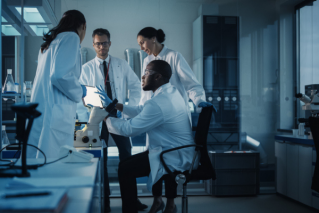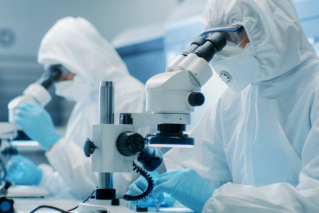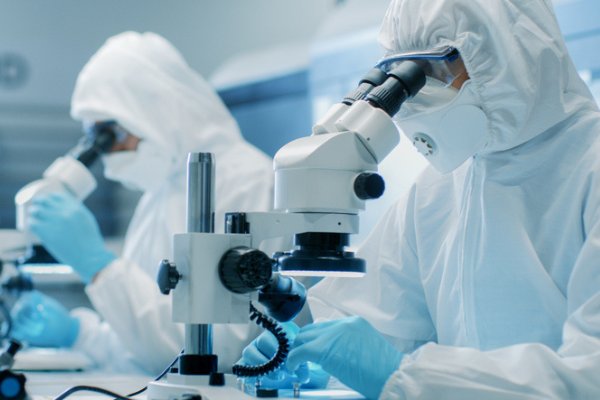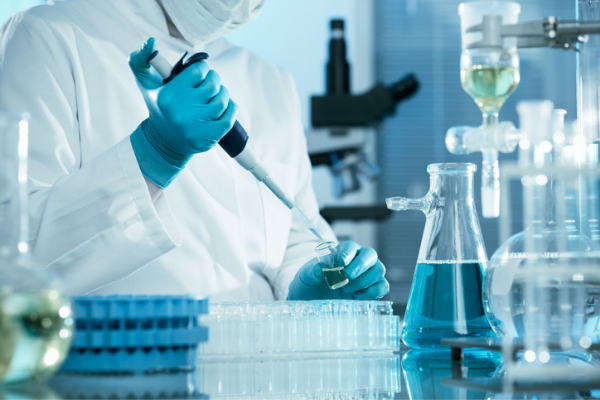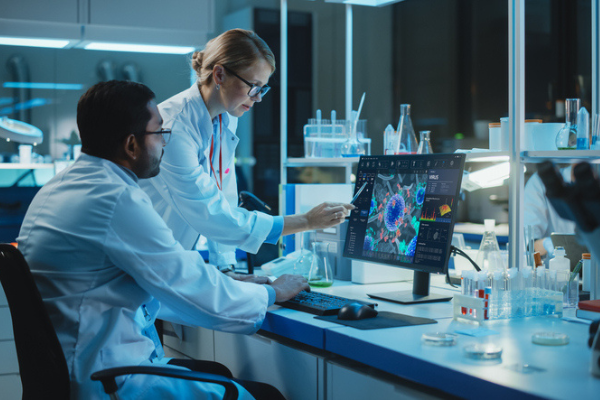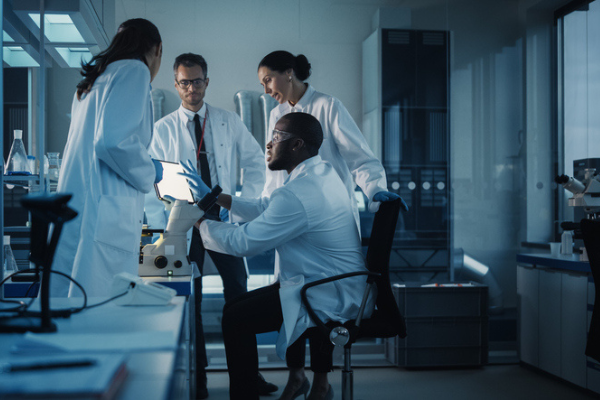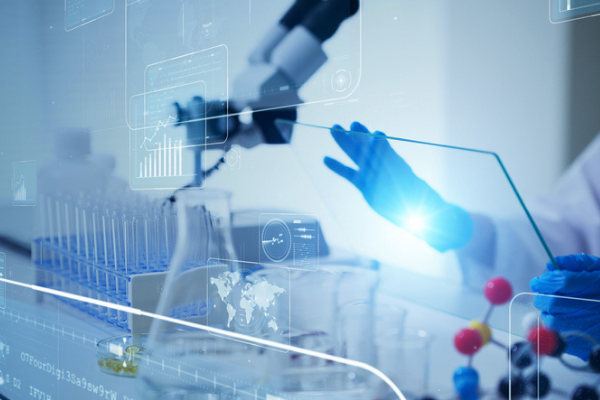
What key factors went into deciding to become a chemical technical professional (CTP)?
My pathway to being a chemical technical professional started at a young age. Science and math were always my favorite subjects in school as I enjoyed learning how and why things work. I gravitated to the STEM fields and after my first couple of science and math courses in college, I decided to major in chemistry. My higher-level chemistry courses developed in me an appreciation for analytical chemistry and I was able to obtain an internship in the BASF analytical laboratories in Wyandotte, MI. I really enjoyed the variety of projects and appreciated how my work impacted the development of products.
Describe your job as a chemical technical professional. What is your favorite part?
I am a chemist who coordinates and conducts environmental and industrial hygiene analyses for BASF in North America. Our mission is to collaborate with Environmental, Health and Safety (EHS) colleagues and business partners to advance sustainability and help our customers be more successful. We provide analytical support to EHS, products, processes, and R&D. Environmental analyses include qualitative identification and quantitative determination for chemicals of concern at trace levels in air, water, soils, and products. Industrial hygiene analyses support protection of human health and evaluate potential workplace exposures to chemical hazards, providing business critical support for safe operations, exposure assessments and investigations. My favorite part of the job is that I am continuously learning something new. There is always a variety of different samples arriving and colleagues looking for different information. That means a diversity of techniques, methods, and instruments are needed.
What daily tasks did you normally tackle as part of a typical workday?
My days are typically a mix of laboratory activities and desk work. The lab analyzes samples by OSHA, NIOSH, EPA, and internal methods under AIHA and ISO17025 accreditation utilizing gas chromatography, liquid chromatography, and gravimetric techniques. I am involved in worker exposure monitoring projects at all stages from planning air sampling, collecting, and analyzing samples to reporting results. This includes decision-making for using the appropriate methods, preparing samples, utilizing instrumentation, processing and interpreting data, writing and reviewing reports, and communicating results. Other activities that might be part of my day include assisting with exposure monitoring, teaching and mentoring interns through daily work and projects, method development, and instrument maintenance, troubleshooting, or repairs. All of this is done in compliance with our high quality and safety standards and best practices.
What was the biggest challenge you confronted in your career?
One of the biggest challenges I have encountered in my career is the need to constantly balance my time and priorities. There is only so much time in the day and I must decide what to focus on first, whether that be a rush project needing immediate attention, routine work, or longer-term project goals and development, which shouldn’t be overlooked. With project priorities changing and choosing how to spend my time, I have learned to be flexible and multitask, when possible, while allowing time to do in-depth work on special projects.
What’s the one thing you wish you had learned earlier in your career?
As my career has developed, my experience has taught me to be more willing to experiment. If you have an idea or thought, give it a chance. It does not hurt to safely test something new or slightly different and you might be surprised how well it turns out. If it doesn’t go the way you expected, it is still a learning opportunity. The biggest advantage we all have as professionals is our unique perspectives, so use it by experimenting and trying your ideas.
Think about an early career CTP. What’s your best piece of advice to help them succeed in the workplace?
The best piece of advice I could give is to take an active role in the work you are doing. Do not simply perform the project with the essential information. It is far better to understand why tasks are done a certain way, not only how they are done. When questions arise, be willing to ask why, research the topic, or test it. It may be that there are faster, easier, or better approaches to accomplishing tasks. This will help you learn and develop as a professional as you expand your skills.
How important is gaining new skills to achieving success as a CTP? Do you think it is better to be a self-learner, or were you a fan of taking additional classes/seminars to gain new skills?
You never know when a new skill or a piece of knowledge could help you do your job better, solve a problem, or achieve the needs of a customer. Science is always evolving; new technology, software, and methods are developed, and to be a successful CTP we must learn with these advances. Both self-learning and additional classes are an important part of gaining these new skills. I enjoy taking additional classes/seminars to gain new skills. There are things I have learned from courses that I might not have discovered on my own. I always learn best through a combination of the two. It is always helpful to get a basis of a concept through self-learning before going into a course which allows me to ask more informed questions and get more out of the course. From there I can expand my knowledge and learn further on my own. This method allows me to feel confident in the foundation of my knowledge in a new topic and able to apply that skill in the future.
What are the hallmarks of a good technician/supervisor relationship?
As with any good relationship, communication is key. Chemists and supervisors should be able to communicate their expectations, goals, problems, and needs. That way they can work towards the same ends efficiently and effectively. As a chemist, I have a responsibility to keep my supervisor and leadership team well informed on the progress of tasks and any challenges that arise. My contribution should support my team’s goals to fulfill the needs of our EHS and business partners. In return, I value a supervisor that will let me work independently and grow my skills but is there for support and can give advice as necessary.
How does your job provide “a bridge”? For example, between lab and consumer, science and manufacturing, or idea and implementation?
Analytical chemistry provides important bridges at many points on the path between the lab and consumer. As analytical chemistry service providers we assist at many stages of product development, from characterizing initial formulations to meeting regulatory requirements. We provide valuable insights for informed decision-making and improved products and processes. We are actively involved in providing solutions for chemical production while proactively supporting research, sustainability goals and performance metrics.
What do you like to do with your time away from the workplace?
A significant portion of my time outside of work is spent with friends and family trying new things or just spending time together. Recently my siblings and I have started to participate in sprint triathlons. When I am not with my friends and family, you can find me curled up with a good book. I enjoy traveling when there is an opportunity, embracing new places and experiences. One of my most memorable trips was to Costa Rica. More often my vacation time is spent at a lake. I love everything to do with the water from summer swimming, tubing, skiing, kayaking, and boating to winter skiing and snowmobiling.
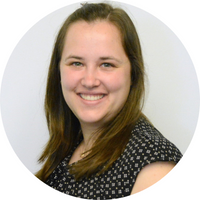
Christine Kaczan is a chemist at BASF with ten years of experience in analytical chemistry. She received her Bachelor of Science in Chemistry in 2014 from Wayne State University and contributed to four publications while doing undergraduate research. She started at BASF Corporation in 2012 as a summer intern in Central Analytics, working several years in the Mass Spectrometry and IR/NMR laboratories.
In 2015 Christine was hired as a full-time employee, providing analytical support for the Dispersions and Resins division. While working full-time,
Christine continued her education and completed her Master of Science in Chemical Sciences with a focus in Analytical Chemistry in 2020 from the University of Michigan in Ann Arbor. Christine now works in the Environmental and Industrial Hygiene Laboratory in the BASF Analytical and Material Science department in North America. She represents BASF as a member of the Analytical Advisory Group for the International Isocyanate Institute, volunteers with the American Industrial Hygiene Association’s (AIHA) Sampling and Laboratory Analysis Committee and recently joined the ASTM D22.04 subcommittee on Workplace Air Quality.
This article has been edited for length and clarity. The opinions expressed in this article are the author's own and do not necessarily reflect the view of their employer or the American Chemical Society.


